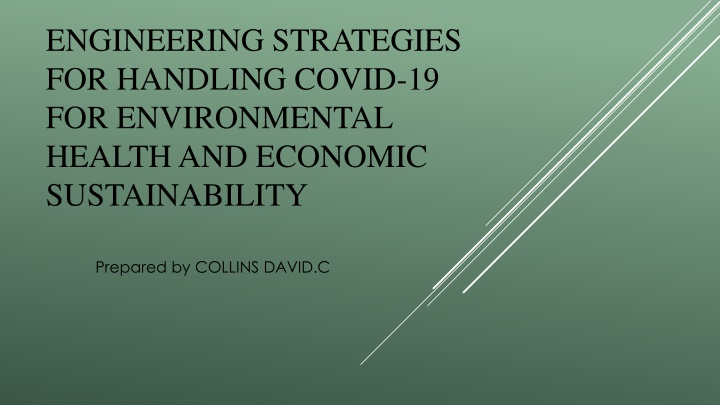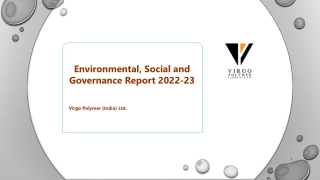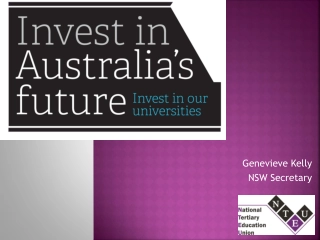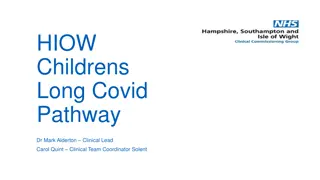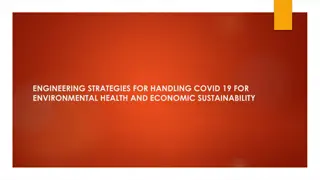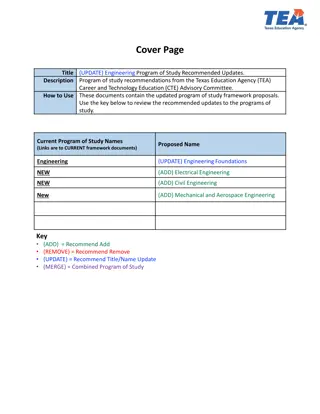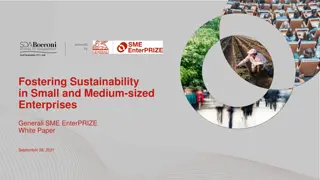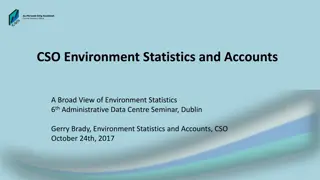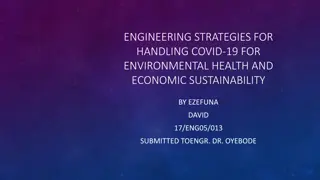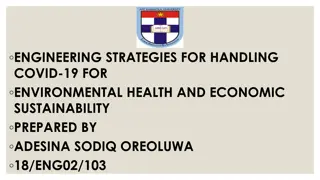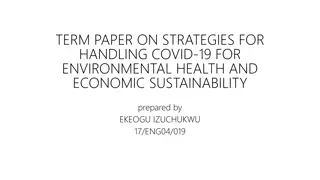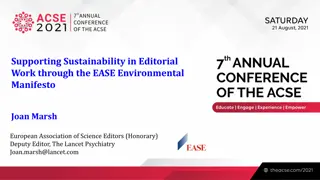Engineering Strategies for Handling COVID-19 for Environmental Health and Economic Sustainability
COVID-19, caused by the novel coronavirus SARS-CoV-2, originated in Wuhan, China in late 2019. The outbreak was linked to the Hunan seafood market, but further investigations revealed human-to-human transmission. Basic protective measures include hand hygiene, social distancing, and staying informed about the pandemic.
Download Presentation

Please find below an Image/Link to download the presentation.
The content on the website is provided AS IS for your information and personal use only. It may not be sold, licensed, or shared on other websites without obtaining consent from the author.If you encounter any issues during the download, it is possible that the publisher has removed the file from their server.
You are allowed to download the files provided on this website for personal or commercial use, subject to the condition that they are used lawfully. All files are the property of their respective owners.
The content on the website is provided AS IS for your information and personal use only. It may not be sold, licensed, or shared on other websites without obtaining consent from the author.
E N D
Presentation Transcript
ENGINEERING STRATEGIES FOR HANDLING COVID-19 FOR ENVIRONMENTAL HEALTH AND ECONOMIC SUSTAINABILITY Prepared by COLLINS DAVID.C
Introduction What is COVID-19: COVID-19 is an acronym that stands for coronavirus disease of 2019. It is the name given by the World Health Organization (WHO) on February 11, 2020, for the disease caused by the novel corona virus SARS-CoV-2, which started in Wuhan, China, in late 2019 and has since spread worldwide. On December 31, 2019, a strange new pneumonia of unknown cause was reported to the Chinese WHO Country Office. A cluster of these cases originally appeared in Wuhan, a city in the Hubei Province of China. These infections were found to be caused by a new corona virus which was given the name 2019 novel corona virus (2019-nCoV).
Origin of COVID-19 Recently, by the end of 2019, WHO was informed by the Chinese government about several cases of pneumonia with unfamiliar etiology. The outbreak was initiated from the Hunan seafood market in Wuhan city of China and rapidly infected more than 50 people. The live animals are frequently sold at the Hunan seafood market such as bats, frogs, snakes, birds, marmots and rabbits. On 12 January 2020, the National Health Commission of China released further details about the epidemic, suggested viral pneumonia. From the sequence-based analysis of isolates from the patients, the virus was identified as a novel coronavirus. Moreover, the genetic sequence was also provided for the diagnosis of viral infection. Initially, it was suggested that the patients infected with Wuhan coronavirus induced pneumonia in China may have visited the seafood market where live animals were sold or may have used infected animals or birds as a source of food.
However, further investigations revealed that some individuals contracted the infection even with no record of visiting the seafood market. These observations indicated a human to the human spreading capability of this virus, which was subsequently reported in more than 100 countries in the world. The human to the human spreading of the virus occurs due to close contact with an infected person, exposed to coughing, sneezing, respiratory droplets or aerosols. These aerosols can penetrate the human body (lungs) via inhalation through the nose or mouth.
Basic protective measures against the new coronavirus: Stay aware of the latest information on the COVID-19 outbreak, available on the WHO website and through your national and local public health authority. Most people who become infected experience mild illness and recover, but it can be more severe for others. Take care of your health and protect others by doing the following: Wash your hands frequently Regularly and thoroughly clean your hands with an alcohol-based hand rub or wash them with soap and water. Washing your hands with soap and water or using alcohol-based hand rub kills viruses that may be on your hands. Maintain social distancing Maintain at least 1metre (3 feet) distance between yourself and anyone who is coughing or sneezing. When someone coughs or sneezes they spray small liquid droplets from their nose or mouth which may contain virus. If you are too close, you can breathe in the droplets, including the COVID-19 virus if the person coughing has the disease.
Stay informed and follow advice given by your healthcare provider Stay informed on the latest developments about COVID-19. Follow advice given by your healthcare provider, your national and local public health authority or your employer on how to protect yourself and others from COVID-19. National and local authorities will have the most up to date information on whether COVID-19 is spreading in your area. They are best placed to advise on what people in your area should be doing to protect themselves.
Avoid touching eyes, nose and mouth Hands touch many surfaces and can pick up viruses. Once contaminated, hands can transfer the virus to your eyes, nose or mouth. From there, the virus can enter your body and can make you sick. Practice respiratory hygiene Make sure you, and the people around you, follow good respiratory hygiene. This means covering your mouth and nose with your bent elbow or tissue when you cough or sneeze. Then dispose of the used tissue immediately. Droplets spread virus. By following good respiratory hygiene you protect the people around you from viruses such as cold, flu and COVID-19. If you have fever, cough and difficulty breathing, seek medical care early Stay home if you feel unwell. If you have a fever, cough and difficulty breathing, seek medical attention and call in advance. Follow the directions of your local health authority. National and local authorities will have the most up to date information on the situation in your area. Calling in advance will allow your health care provider to quickly direct you to the right health facility. This will also protect you and help prevent spread of viruses and other infections.
Protection measures for persons who are in or have recently visited (past 14 days) areas where COVID-19 is spreading: Follow the guidance outlined above. Stay at home if you begin to feel unwell, even with mild symptoms such as headache and slight runny nose, until you recover. Why? Avoiding contact with others and visits to medical facilities will allow these facilities to operate more effectively and help protect you and others from possible COVID-19 and other viruses. If you develop fever, cough and difficulty breathing, seek medical advice promptly as this may be due to a respiratory infection or other serious condition. Call in advance and tell your provider of any recent travel or contact with travelers. Calling in advance will allow your health care provider to quickly direct you to the right health facility. This will also help to prevent possible spread of COVID-19 and other viruses.
Effects of COVID-19 on the Nigerian economy For most developing economies, the chances of sliding into a downturn are gradually expected as the global coronavirus outbreak puts severe pressure on the economy. For Nigeria, the country is still sluggishly grappling with recovery from the 2016 economic recession which was a fall out of global oil price crash and insufficient foreign exchange earnings to meet imports. In the spirit of economic recovery and growth sustainability, the Nigerian federal budget for the 2020 fiscal year was prepared with significant revenue expectations but with contestable realizations. The approved budget had projected revenue collections at N8.24 Trillion, an increase of about 20% from 2019 figure. The revenue assumptions are premised on increased global oil demand and stable market with oil price benchmark and oil output respectively at $57 per barrel and 2.18 Million Barrels Per Day.
The emergence of COVID-19 and its increasing incidence in Nigeria has called for drastic review and changes in the earlier revenue expectations and fiscal projections. Compared to events that led to recession in 2016, the current state of the global economy poses more difficulties ahead as the oil price is currently below US$30 with projections that it will dip further going by the price war among key players in the industry. Unfortunately, the nation has grossly underachieved in setting aside sufficient buffers for rainy days such as it faces in the coming days. In addressing these daunting economic challenges, the current consideration to revise the budget downward is inevitable. However, certain considerations that are expected in the review must not be left out. The assumptions and benchmarks must be based on realizable thresholds and estimates to ensure optimum budget performance, especially on the non-oil revenue components. Furthermore, cutting expenditures must be done such that the already excluded group and vulnerable are not left to bear the brunt of the economic contraction. The economic and growth recovery program which has the aim of increasing social inclusion by creating jobs and providing support for the poorest and most vulnerable members of society through investments in social programs and providing social amenities will no doubt suffer some setbacks. Besides, the downward review of the budget and contractions in public spending could be devastating on poverty and unemployment. The last unemployment report released
by the National Bureau of Statistics (NBS), ranks Nigeria 21st among 181 countries with an unemployment rate of about 23.1%. The country has also been rated as the poverty capital of the world with an estimated 87 million people living on less than $2 a day threshold. The decision to cut the retail price of gasoline under a price modulation arrangement is a welcome development. The cut is expected to curb rising inflation, especially food price inflation which will mainly benefit the poor. However, rather than the price capping regime introduced, by which it is expected of the Petroleum Products Price Regulation Agency (PPPRA) to constantly issues monthly guide on appropriate pricing regime. It is expected that the government will use this opportunity to completely deregulate the petroleum industry in line with existing suggestions and reports. In the event that the global economy becomes healthier and crude oil prices increases, the government might return to the under-recovery of the oil price shortfall by the Nigerian National Petroleum Corporation (NNPC), a policy that annually costs the government huge revenue and recurring losses to the NNPC.
Basically, the Nigerian government essentially must lead economic diversification drive. It is one practicable way to saddle through the current economic uncertainties and instabilities. What the consequences of COVID-19 pandemic should further offer the Nigerian economic managers and policymakers, is that the one-tracked, monolithic reliance on oil is failing. Diversification priorities to alternative sectors such as agriculture, solid minerals, manufacturing and services sectors should be further intensified.
Handling COVID-19 for environmental health and economic sustainability Taking a critical look at the current situation, the best and most effective measure for preventing the spread of the virus is through social distancing. This is best achieved by imposing compulsory lockdowns. These lockdowns affect a lot institutions and gatherings including; schools, markets, manufacturing industries and businesses, religious gatherings and social functions etc. It also affects rates in demand and supply of several commodities and a decline in mobility which is a major source of employment. An increase in everyday necessities such as food, water and toiletries matched with a decrease in their availability due to the lockdown may slowly lead to a breakdown of law and order if prolonged. However the following strategies can be adopted to contain the situation: Automation and Artificial Intelligence: Tackling the problems associated with imposing lockdowns requires hand-on relevant and efficient technology. High demand should hence be placed on automation and artificial intelligence, in order to achieve productivity with less human contact and effort, as well as aid delivery and dispensing of items at sale points and aid transportation.
Simple safe devices and methods should be adopted to help easy and faster detection prevention and control of possible cases of the virus such as; the drive through tests, hand sanitizer dispensers, smart helmets (as implemented in China). Communication and connectivity: Communication and connectivity is a necessity of this period. It is of great importance that the public be kept informed with the latest updates on information regarding measures for their personal safety, as the virus is being studied and as it evolves. It is also important that individuals are aware of the new laws enacted to contain the situation. Apart from ensuring public awareness, connectivity is also required to keep institutions and businesses on course. To reduce the effect of the lockdown, platforms should be made available to aid online learning for secondary and tertiary institutions, also businesses can also be done using these online platforms as meetings, conferences etc can be held via a good connection, as well as transactions.
Intensive increase in agricultural mechanization: Agriculture should be given greater priority as more agricultural produce are required and its availability is a necessity. Farmers should still be allowed to work under strict conditions and aided with equipments for greater production. Focus for the economy: Henceforth the government should focus its resources on self sustaining sectors of the economy of which agriculture is a major component. A sector is self sustaining when it generates revenue not only from exports but also from consumption within the country. Agriculture should be given great consideration, as lockdowns will affect export, it will still play an important role in keeping the nation fed and sustain the economy. The oil sector should also hence be converted to a self sustaining sector. The need for refineries in the country cannot be over emphasized. As other countries impose lockdowns and travel bans, exporting crude oil for refining would no longer be possible. This would lead to a decrease in supply of petroleum products for the country and since the Nigerian economy is focused on crude, it would greatly affect internal revenue of the country.
Conclusion The COVID-19 virus which started in China has spread globally and the resulting deaths are still on the rise. It is therefore highly important that strict measures are put in place to stop the spread of the virus. Individuals should be made to realize that there is currently no vaccine available for its treatment. However the effects of the virus can be greatly reduced by adopting the strategies stated in the previous chapter.
Recommendation The effects of a pandemic cut across every facet of human existence. To reduce the effects as well as prevent further spread of the virus, it is important that individuals play their role of strict adherence to personal preventive measures and also the enacted laws which include; lockdowns and travel bans. Furthermore, handling a pandemic requires hands-on reliable and efficient technology, hence engineering solutions and strategies should be adopted to aid the prevention and control of the virus.
